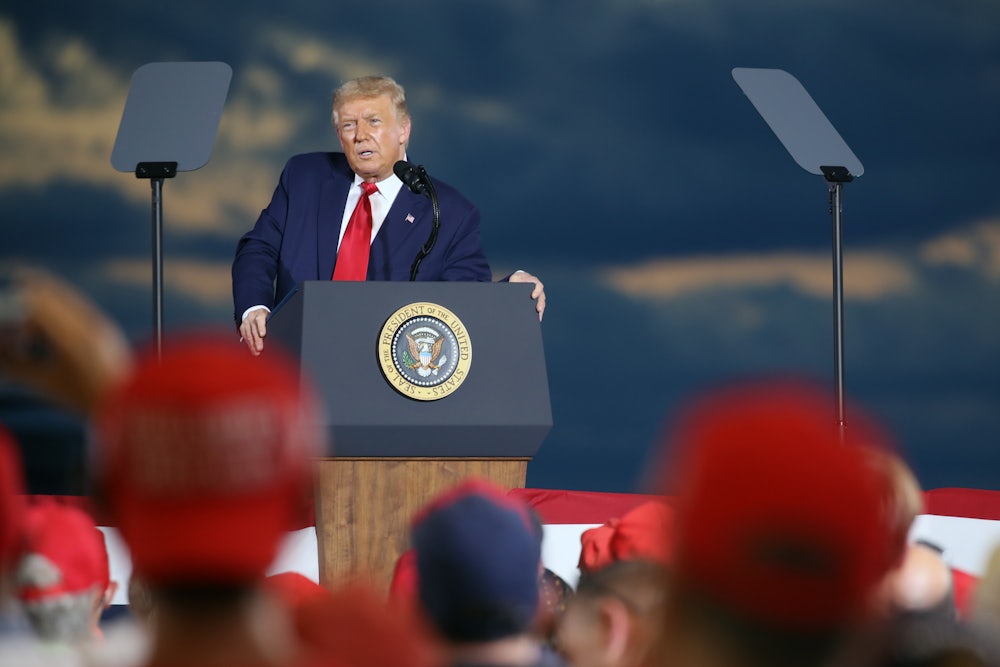At last week’s Republican National Convention, the GOP made its election strategy very clear: It would do everything in its power to amplify violence and cheer on disorder in order to reelect Donald Trump. “The more chaos and anarchy and vandalism and violence, the better it is for the very clear choice on who’s best on public safety, law, and order,” senior adviser Kellyanne Conway told Fox News. With over six million confirmed Covid-19 cases in the United States and the economy in tatters, the GOP’s only hope was to pray for mayhem.
Over the weekend, Republicans got their wish. On Saturday evening, Jay Bishop was shot and killed in Portland, Oregon, after he and other supporters of the far-right group Patriot Prayer entered the city to antagonize left-wing protesters. The president unleashed a torrent of tweets and retweets praising such groups as “GREAT PATRIOTS” and attacking anti–police brutality protesters as “disgraceful anarchists.” A week after Kyle Rittenhouse, a Trump-supporting teenager, killed two protesters in Kenosha, Wisconsin, the president and his supporters pushed the message that they were the only thing preventing the chaos in Portland from spreading throughout the country.
As The Washington Post reported in July, Trump sees civil unrest as “a chance to appear as a field general in a wider American cultural conflict.” The language of “law and order” is both a racist dog whistle and an Orwellian cover-up of the fact that he is actively encouraging violence and conflict for political gain. The conservative media has played along, depicting a dystopian hellscape not only in Portland, where looting and arson have occurred downtown, but also in Washington, D.C., and New York City, much to the surprise of the people who live there.
That is to be expected. But Trump’s message has also received a boost from mainstream outlets, which in the past week have turned left-wing unrest in Portland and Kenosha into the most important political issue facing the country with two months to go until the election—an election that should by all rights be a referendum on a catastrophic presidency. Nowhere is this clearer than in the insistent framing that this unrest might be “bad” for the Democratic nominee, Joe Biden.
The idea that left-wing political violence threatens Biden’s election efforts has been raised again and again, particularly by conservative Never Trump figures. George Will, Max Boot, and Bret Stephens have all made the case that the situation in Portland will scare white voters into the arms of Donald Trump. At the same time, the bizarre idea that Biden is secretly supportive of antifa is continuously floated both by the president (who suggested on Monday that Biden was being controlled by people in “dark shadows”) and by bad faith right-wing media figures. All of this puts Biden in the odd position of having to condemn rioting and political violence even when he has already done so multiple times, declaring in a speech this week that, “Rioting is not protesting. Looting is not protesting. Setting fires is not protesting.”
Pretty Amazing coordination of a talking point. pic.twitter.com/7vIsZrg0oM
— Gabriel Steel. 🤔 ⚖️ 🇺🇸 (@Steel94010) August 31, 2020
It’s not only the right that has put Biden in this position. Something similar happened in the freak-out among liberal and centrist figures in the media over an NPR interview with Vicky Osterweil about her book In Defense of Looting. There is a deep paranoia that the elevation of fringe ideas—which, again, Joe Biden roundly rejects—will damage his chances.
A great deal of this hand-wringing is based on the long-held presumption that “law and order” campaigns benefit Republicans and damage Democrats, thanks in large part to successfully racist campaigns run by Richard Nixon in 1968 and George H.W. Bush in 1988. Nixon’s law and order campaign and Bush’s race-baiting Willie Horton ad were effective, but they occurred in a much different country. The U.S. is significantly less white than it was in 1988, let alone 1968. Bush and Nixon, moreover, were not incumbents—Trump is currently in charge of the country he is pledging to save from violence, a point that Biden made in his speech.
Gallup polling released earlier this month found that only 4 percent of voters think that crime is the most important problem facing the country. Meanwhile, 52 percent disapprove of Trump’s handling of the issue.
Trump’s law and order messaging is contradicted by his own encouragement of political violence and his refusal to condemn Rittenhouse’s vigilantism. This would seem to be the riskier political position to take as we head into November, while his opponent steadfastly condemns violence on “all sides.” But pundits are naturally inclined to believe that Trump has found a winning message, that he is practicing some dark electoral magic, so the pressure builds on Biden—again!—to shut down this opening by condemning mob violence. And there goes another news cycle, while the lines for unemployment, and the number of Covid cases, grow.
It’s become a commonplace to make fun of the idea that Trump is igniting some controversy in order to distract from another blazing controversy. But his obsession with a few pockets of violence around the country really is a distraction—and the press is falling for it.
